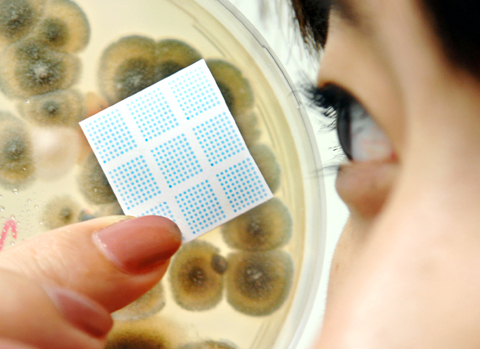A thumb-sized chip could be the answer to people who suffer from indoor pollutants.
The Environmental Protection Administration (EPA) yesterday unveiled the world’s first DNA chip capable of detecting 21 types of harmful and allergenic bacteria within three to five days. Measuring 8mm by 7mm, the electrical hybridization chip is smaller than a NT$1 coin. The chip contains 21 probes, each containing the DNA elements of the 21 bacteria considered dangerous to humans.
Developed by the EPA and National Cheng Gung University, the chip can detect harmful air-borne bacteria, such as aspergillus flavus, aspergillus versicolor and chaetomium globosum, which are known to cause allergic reactions such as coughing, sneezing and runny noses.

PHOTO: CNA
EPA Environmental Analysis Laboratory Chief Hung Wen-tsung (洪文宗) said the chip has 98 percent accuracy, adding that the EPA was in the process of applying for a patent.
Starting in May, 30 elementary schools and kindergartens will be tested for mold pollution using the device.
Hung said that a petri dish is placed in a sampling pump to collect an air sample for a period of between 10 minutes and 20 minutes.
The cultural sample with the bacteria particles is then compared with strains of pathogen present in various bacteria. A matching strain indicates the presence of such bacteria in the air, he said.
The entire process can be completed within three to five days, he said, adding that this was a major improvement from a previous model, developed in 2008, which could only detect 10 target bacteria in one month.
The chip costs about NT$100 and can be reused, Hung said.
While the chip does not provide qualitative information such as the density of bacteria in the air, such a function “is our goal for the future,” Hung said.
The EPA said the average person spends between 80 percent and 90 percent of his or her time indoors and household allergens have become one of the biggest problems for urban dwellers.
Early detection of harmful bacteria in the air could alert schools and teachers of the need to clean up their classrooms, especially often-ignored corners where mold accumulates, Hung said.

The Ministry of Education (MOE) is to launch a new program to encourage international students to stay in Taiwan and explore job opportunities here after graduation, Deputy Minister of Education Yeh Ping-cheng (葉丙成) said on Friday. The government would provide full scholarships for international students to further their studies for two years in Taiwan, so those who want to pursue a master’s degree can consider applying for the program, he said. The fields included are science, technology, engineering, mathematics, semiconductors and finance, Yeh added. The program, called “Intense 2+2,” would also assist international students who completed the two years of further studies in

Former president Tsai Ing-wen (蔡英文) departed for Europe on Friday night, with planned stops in Lithuania and Denmark. Tsai arrived at Taiwan Taoyuan International Airport on Friday night, but did not speak to reporters before departing. Tsai wrote on social media later that the purpose of the trip was to reaffirm the commitment of Taiwanese to working with democratic allies to promote regional security and stability, upholding freedom and democracy, and defending their homeland. She also expressed hope that through joint efforts, Taiwan and Europe would continue to be partners building up economic resilience on the global stage. The former president was to first

The brilliant blue waters, thick foliage and bucolic atmosphere on this seemingly idyllic archipelago deep in the Pacific Ocean belie the key role it now plays in a titanic geopolitical struggle. Palau is again on the front line as China, and the US and its allies prepare their forces in an intensifying contest for control over the Asia-Pacific region. The democratic nation of just 17,000 people hosts US-controlled airstrips and soon-to-be-completed radar installations that the US military describes as “critical” to monitoring vast swathes of water and airspace. It is also a key piece of the second island chain, a string of

Taiwan will now have four additional national holidays after the Legislative Yuan passed an amendment today, which also made Labor Day a national holiday for all sectors. The Chinese Nationalist Party (KMT) and Taiwan People’s Party (TPP) used their majority in the Legislative Yuan to pass the amendment to the Act on Implementing Memorial Days and State Holidays (紀念日及節日實施辦法), which the parties jointly proposed, in its third and final reading today. The legislature passed the bill to amend the act, which is currently enforced administratively, raising it to the legal level. The new legislation recognizes Confucius’ birthday on Sept. 28, the